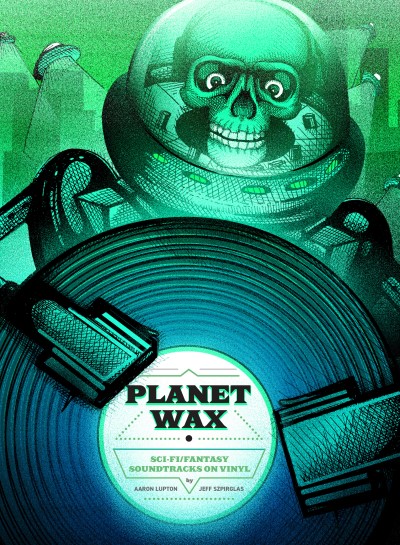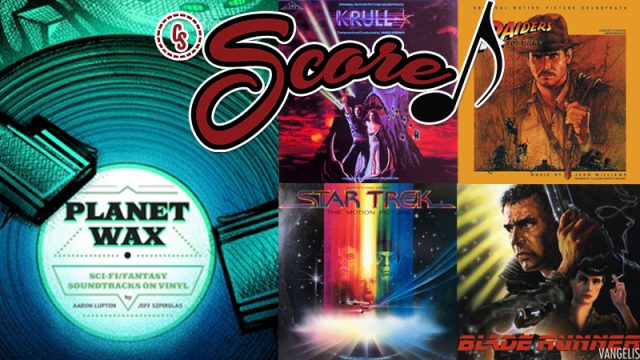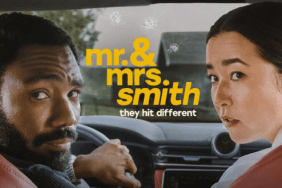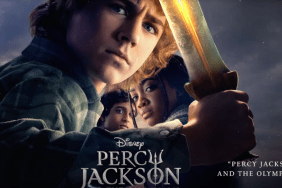Welcome back, film score lovers! This week we get to take you on a tour of Planet Wax: Sci-Fi/Fantasy Soundtracks On Vinyl, the awesome new book from Aaron Lupton and Jeff Szpirglas, the creators behind 2019’s Blood on Black Wax: Horror Soundtracks on Vinyl. We were also lucky enough to have Szpirglas discuss his new book in an exclusive interview! Let’s do this thing!
RELATED: CS Score Reviews Casper and Chats with Emmy Nominee Amanda Jones
 Planet Wax Review
Planet Wax Review
As a kid, I spent a lot of time lounging in front of my CD player listening to film soundtracks. I can remember my dad buying me the score for John Williams’ Star Wars: Episode I — The Phantom Menace and staring intently at Drew Struzan’s artwork whilst avoiding the spoilery content on the back. My soundtrack collection spanned bookshelves, and I’ve always regretted the day I switched to digital and dumped a vast majority of that collection. (I’m currently in the process of restocking!)
Planet Wax, the terrific new book from Aaron Lupton and Jeff Szpirglas feels like a celebration of those records and/or CDs we used to purchase and prop up like a holy relic in our homes before the internet obliterated the music store and relegated our favorite soundtracks to compressed byte-sized data on our cell phones. Ah, the good ole days.
The book spans over 200 pages and features beautiful artwork from renowned film scores such as John Williams’ Star Wars trilogy, Brad Fiedel’s The Terminator, Dave Grusin’s The Goonies, James Horner’s Cocoon, and Vangelis’ Blade Runner, among, oh, so many others. And each picture is accompanied by details about the score on display as well as the occasional interview with the likes of director Richard Donner, and composers Christopher Young, David Shire, Laurence Rosenthal, Barry Schrader, Brad Fiedel, Bruce Broughton, and many others who reveal interesting tidbits regarding the great science fiction/fantasy scores of our time.
Really, it’s genuinely thrilling to read about Donner’s first reaction to Williams’ now iconic Superman theme — “…if you really listen,” Donner says at one point, “he actually says ‘Superman’ with the music [in that three-note motif].” — or the way Bruce Broughton was inspired by Mozart for Harry and the Hendersons. There’s even a bit in which music producer Craig Huxley discusses what it was like working with Jerry Goldsmith and James Horner on Star Trek: The Motion Picture and Star Trek II: The Wrath of Khan. Great stuff!
And, as stated, each of these stories features artwork from the records themselves, which makes for an entertaining visual to flip through on a Saturday afternoon. It is strange to see so many unique movie posters designed with so much attention to detail, created by real artists on a physical canvas — a stark contrasts with modern movie ads that seem plastered together using photoshop. Planet Wax entombs these undervalued masterpieces in one gigantic, thrilling read that true film score enthusiasts will most certainly appreciate. Essentially, it’s like reading a massive collection of linear notes, which was always part of the fun when purchasing a new soundtrack.
If anything, Planet Wax transports the reader back to that magical moment in time where one could head to their local music store and spend hours sifting through mountains of records and CDs in search of their favorite artist, band, composer, or score and run home with a little bit of magic tucked under their arm.
Planet Wax: Sci-Fi/Fantasy Soundtracks On Vinyl will release on September 29. Pre-order your copy here!
Interview with Planet Wax Author Jeff Szpirglas
About Jeff Szpirglas: Jeff has been rabidly listening to film soundtracks since picking up an audio cassette of Return of the Jedi back in 1983. Over the years, he has contributed to Film Score Monthly and now regularly writes for Rue Morgue magazine. He is also the author of over 20 books for young readers, ranging from horror novels to nonfiction tomes. Follow him at JeffSzpirlgas.com.
Click here to purchase Blood on Black Wax!
ComingSoon.net: Talk about the book Planet Wax — where did the idea originate to do a follow up to Blood on Black Wax?
Jeff Szpirglas: Long before I delved into horror scores, I’d been listening to and collecting the music from the sci-fi films that defined my youth. Being born in the mid-Seventies means that I grew up in the midst of the Spielberg/Lucas years, which was such a Renaissance for all of these genre films. As much as I enjoy horror soundtracks like Dracula or Halloween, the scores that really got me into collecting were for films I was actually allowed to watch as a kid. Even as Aaron and I were writing Blood on Black Wax, I had the thought of pursuing a book about SF scores in the same manner.
CS: What are some of the ways you consider this book different than its predecessor?
Szpirglas: Blood on Black Wax dips back into really early classics, like Bride of Frankenstein and King Kong, and hurtles through the years all the way up to modern entries like Get Out and Hereditary. With Planet Wax, we decided upon keeping the soundtracks tied to the seventies through to the end of the nineties, so that the book wouldn’t be dated so quickly. Aaron and I do explore some earlier scores, especially for the iconic television series that came out in the sixties: Star Trek, Doctor Who, Lost In Space, etc. We didn’t cover any television scores in the first book, but television was such a great medium for the sci-fi genre that we felt it would be a huge oversight to skip over those scores.
CS: What about vinyl has struck a chord in contemporary times — or, why do you think vinyl has made such a strong comeback?
Szpirglas: Aaron’s probably your best bet to answer that question, given that he has an attic full of records, while my collection fills a shelf or two. Records obviously showcase the art – look at labels like Waxwork, Terror-Vision, or Enjoy The Ride Records, and you get these wonderfully deluxe new editions that are often quite lavish – a far cry from some of the earlier albums that may have simply reproduced the poster art on their covers, although even then, the 12×12” space of a record was almost like having a mini-poster you could keep on your shelf. I think the appeal of record collecting, apart from the enjoyment of the music, says something about our enjoyment to curate, and also of the tactile nature of owning something – whether it’s art, or comics, or in my case, soundtracks and Doctor Who memorabilia. I think the resurgence of vinyl speaks to this desire to contain the intangible nature of video and music into something more concrete.
CS: Part of the fun for me, as someone who collects CDs, is having a physical case and cover to look at — I’ve always appreciated the artwork and information found within the linear notes — this book seems to be a celebration of that ideology, would you agree? Why or why not?
Szpirglas: I’m a big CD collector myself, for the reasons that you mention. I got into soundtrack collecting at a point where people were making the jump for vinyl to digital. In fact, I vividly remember dropping fifty bucks on the Japanese CD of Raiders of the Lost Ark, only to find out that DCC Compact Classics issued a deluxe double-length CD a year or two later, and with copious liner notes (I still have both CDs). So, to get to your question, yes – the books really embrace the idea of a collection; something tactile that you can hold in your hands, and with some explanation as to what you’re listening to, or how it was created. Listening to film music in isolation is a unique experience; you’re often recreating the film in your head, or your memory of the film in your imagination. And hearing the music divorced from the story, the sound effects, and dialogue allows for a different portal into that film experience.
CS: What were the challenges of developing the book?
Szpirglas: There was always a wealth of music and films to choose from, and in some cases, paring down the choices, or cutting down the length of the interviews was sometimes tricky. The goal of the book is to unpack the film and the score in a limited amount of space. So the book isn’t going to go into the same degree of depth as an academic text. We’re really trying to distill the essence of the music and its importance in around 300 – 350 words, and I could have devoted four pages to the power and the glory that is the soundtrack to Krull.
CS: What was it like interviewing all of these directors — Richard Donner, Nicholas Meyer — and composers?
Szpirglas: For me, those interviews were really the raison d’etre of writing the book. If it were possible, I would have included interviews for every entry, although some of the composers are long gone, and not everyone was reachable. Some of the interviews were done live, and some via email, but it was a pleasure to hear from some of my childhood heroes – such as Laurence Rosenthal, who kindly, and quite eloquently, answered all of my questions about Clash of the Titans. A lot of these scores are thirty to forty years old, so there’s always that fear that you’re speaking about something really esoteric that may not be well-remembered, and yet you have a guy like Stu Phillips, who wrote an insane amount of television and film music over the years and can still speak with a high degree of clarity about the differences of orchestrating for the likes of Buck Rogers and Battlestar Galactica.
CS: Were there any stories you wanted to include, but couldn’t?
Szpirglas: Because of the visual nature of the book, it did mean that we had to cut back on some of the interview quotes. For example, Craig Safan recounted how he came up with one of the themes for The Last Starfighter while driving around, at a stoplight. I’d heard that story before, but the new revelation is that the little sub-theme that plays around the main refrain is actually a musical statement of those words: “The Last Starfighter.” It’s what John Williams does with his punchy theme for Superman, or what James Bernard did for Hammer, having the music actually say the words “Dracula” or “Quatermass.”
CS: What do you want readers to take away from Planet Wax?
Szpirglas: As with Blood on Black Wax, you’re basically taking away a record collection in book form. But I hope the book will provide an opportunity to appreciate the innovative use of sound and music in a genre that has traditionally asked for a lot, visually speaking. Whether or not the special effects for these movies hold up, they are aided immeasurably by their sound design and music to help render and evoke their imaginary worlds.
CS: What soundtracks do you wish you could have included?
I was really pushing for some of the older sci-fi soundtracks from the fifties and sixties, although their vinyl representation aren’t great. But scores like Dimitri Tiomkin’s The Thing (From Another World) and Bernard Herrmann’s work in the genre, like The Day The Earth Stood Still and Fahrenheit 451, are exemplary. And because we had a chapter on sci-fi/horror in Blood on Black Wax, it meant that we didn’t include things like Forbidden Planet or the Alien films this time around.
CS: What future books do you have planned, if any?
Szpirglas: This is the year where literally four books were due to come out, and then COVID-19 hit. I’m working away at an anthology of children’s horror stories, and I do have at least one more soundtrack book I’d like to pursue. Let’s hope Planet Wax does well enough to justify a third entry in the series.
CS: What is your favorite soundtrack in Planet Wax? Why? Which one is the most underrated?
Szpirglas: I’d be lying if I didn’t say Star Wars, although Empire is my favorite score (and film) in the series. That music was a ubiquitous part of my childhood, and elevates those movies to such a cosmic level. John Williams is largely responsible for imbuing the saga with its fairy-tale quality. Visually, the story evokes the future, but the music is archaic, coming from the derring-do swashbucklers of the past.
I’m glad we also have a place to celebrate the music of Doctor Who, which, aside from the eerie theme music, could sound like almost anything. The show utilized everything from library tracks to really experimental electronic music to small chamber orchestras to this bold, glossy synth music in the eighties. There’s a real, malleable quality to what Doctor Who as a show is – you can change the lead character, change the style of storytelling, and still boil down the essence of the show into something that endures. I find that this is the case musically, as well.
Plus, you know, Krull.










